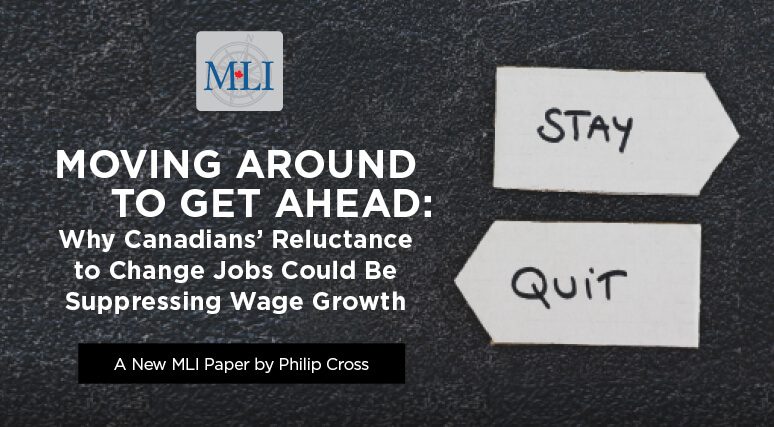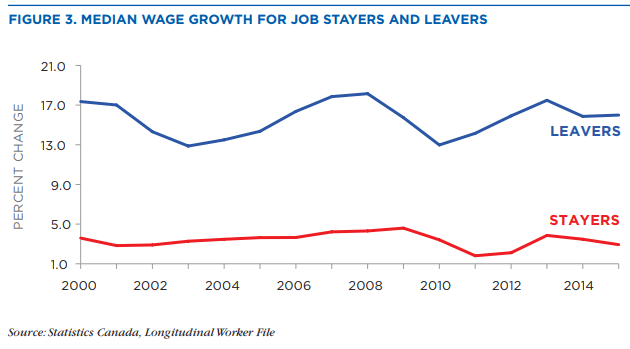 OTTAWA, ON (December 11, 2019): Unemployment is at record lows in Canada, which usually means wages are set to rise. However, despite high demand for labour, wages have remained largely stagnant; why is this happening?
OTTAWA, ON (December 11, 2019): Unemployment is at record lows in Canada, which usually means wages are set to rise. However, despite high demand for labour, wages have remained largely stagnant; why is this happening?
While there are many competing theories, in a new study, MLI Munk Senior Fellow Philip Cross finds that Canadians’ lack of willingness to change jobs might be contributing to lower wages. In the new paper titled Moving Around to Get Ahead: Why Canadians’ Reluctance to Change Jobs Could Be Suppressing Wage Growth, Cross outlines the compelling evidence behind this phenomenon.
Cross finds that the median wage increase for “job leavers” averaged 15.4 percent in the post-recession period from 2010 to 2015. For “job stayers” it was 2.9 percent. But despite the potential attraction of a raise in pay, the share of job leavers hit a low of 3.0 percent in 2010 in the wake of the recession and remained below 4.0 percent, averaging 3.7 percent for the whole period from 2010 to 2015. This compares to a rate of 4.2 percent in the period from 2000-2009.
According to Cross, the willingness of workers to change jobs reflects the labour market’s efficiency to match workers with labour demand. When this relationship is not running effectively, one consequence is lower wages.
While technological advancement, employment concentration, and globalization may all be contributing to the mismatch between unemployment rates and wage growth, what is clear is that people switch jobs more frequently and with better outcomes when the economy is running well. And while switching jobs is not a guarantee of increased income, on average those who change jobs have improved their wage prospects far quicker than workers who choose to stay in place.
 “Wage increases for the growing number of workers staying in their jobs slowed nearly a full percentage point following the recession,” writes Cross. This points to the fact that, despite rosy unemployment figures, labour market and macroeconomic conditions are more complex than policy-makers often appreciate.
“Wage increases for the growing number of workers staying in their jobs slowed nearly a full percentage point following the recession,” writes Cross. This points to the fact that, despite rosy unemployment figures, labour market and macroeconomic conditions are more complex than policy-makers often appreciate.
So why are Canadians so reluctant to change work if the benefits of doing so are so clear? Cross points to several reasons for this trend, including older workers staying in senior positions, Canadians choosing to stay in their preferred region or area, and economic anxieties brought about by turbulent economic times.
“The decline in job leavers appears related to both the aging of the labour force and rising insecurity about jobs,” writes Cross. If governments in Canada are interested in improving worker outcomes, then it must be made clear to Canadians that a more efficient labour market better able to match workers with opportunities is a key to wage growth.
While the relationship between wages and unemployment is complex, it is clear from the data that Canadians are less willing to switch jobs, and thus wages have lagged behind low unemployment numbers.
To learn more about how Canadians’ reluctance to change jobs may be dampening wage growth, read the full study here.
***
Philip Cross is a Munk Senior Fellow at the Macdonald-Laurier Institute. Prior to joining MLI, Mr. Cross spent 36 years at Statistics Canada specializing in macroeconomics. He was appointed Chief Economic Analyst in 2008 and was responsible for ensuring quality and coherency of all major economic statistics.
For more information, media are invited to contact:
Brett Byers
Communications and Digital Media Manager
613-482-8327 x105
brett.byers-lane@macdonaldlaurier.ca




